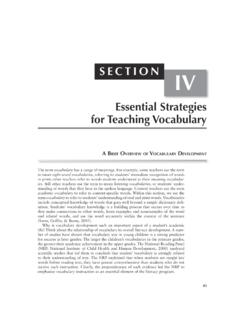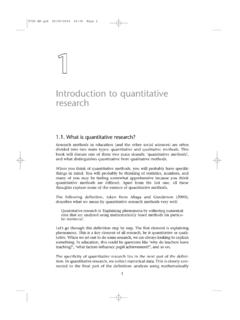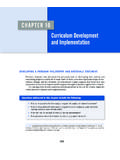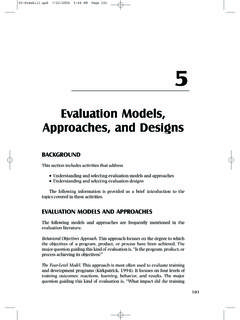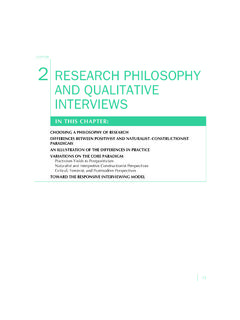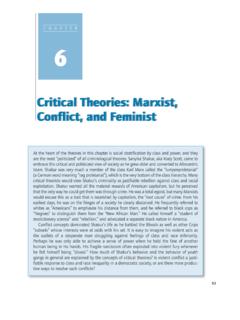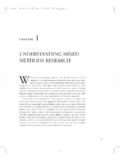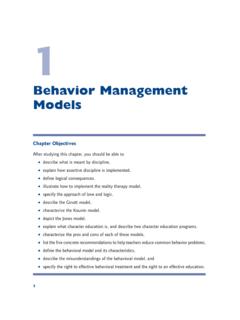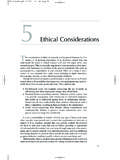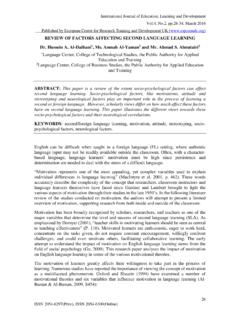Transcription of CHAPTER Culture’s Influence 13 on Perception
1 CHAPTER1 FOCUS QUESTIONS In general, how does culture provide for humans? What are the meanings of the terms culture , subculture, ethnicity, co- culture , subculture, subgroup, and race? What are some of the major issues in today s cultural contact zones?CHAPTER3 FOCUS QUESTIONS What is the relationship between culture and sensation? What is the relationship between culture and each step of the Perception process? What is the distinction between high-context and low-context cultures? What is meant by the concept of face? How can cultural interpretations placed on perceptions, such as food, reflect other elements of culture ? culture s Influence on PerceptionSensingEffect of culture on SensingPerceivingSelectionJapanese/Engli sh Difficulties With Speech SoundsOrganizationGrouping Like Objects TogetherInterpretationDogs as Pets or as FoodWeather Vane as Christian CrossHigh Versus Low ContextThe Concept of FaceA Case Study of Perception and FoodSummaryDiscussion QuestionsKey TermsReadingsStudent Study SiteCHAPTER 3 culture s Influence on Perception59 This CHAPTER is about the effect of culture on our Perception of the world external to our minds.
2 Can we say that there is a world external to our minds; that is, independent of our awareness of it? Wexler (2008) states it dramatically by stating the relationship between the individual and the environment is so extensive that it almost overstates the distinction between the two to speak of a relationship at all (p. 39). Sensory input is a physical interac-tion; for example, cells in our mouths and noses have receptor molecules that combine with molecules from the environment to initiate electrical impulses. Our Perception and thought processes are not independent of the cultural our Perception and thought processes are such a part of what is out there, what then is the relationship between changes in the cultural environment and who we are?
3 Wexler points out that we humans shape our environment and, hence, it could be said that the human brain shapes itself to a human-made environment. Our brain both is shaped by the external world and shapes our Perception of the external this CHAPTER we first examine the effects of culture on the sensation process. Then we examine the Perception process. While the effect of culture on Perception is independent of language , language (as we examine in a later CHAPTER ), influences thought. Some of the exam-ples in this CHAPTER illustrate the interrelationships of Perception , language and thought. Later in the CHAPTER , you will read about the concept of high-context and low-context cultures and the concept of face. And as food choices are examples of the perceptional step of interpreta-tion, you will read about food in of the research in this area and most of the examples in this CHAPTER contrast Eastern and Western cultures.
4 Nisbett (2003) and others contend that Eastern and Western cultures literally perceive different worlds. Modern Eastern cultures are inclined to see a world of substances continuous masses of matter. Modern Westerners see a world of objects discrete and unconnected things. There is sub-stantial evidence that Easterners have a holistic view, focusing on continuities in substances and relationships in the environment, while Westerners have an analytic view, focusing on objects and their ON culture Greeks Had Aristotle and the Chinese Had ConfuciusPART 1 culture AS CONTEXT FOR COMMUNICATION60 SENSINGS ensation is the neurological process by which we become aware of our environment. Of the human senses, sight, hearing, smell, taste, and touch, including pain, temperature, and pressure, are the most studied (Gordon, 1971).
5 The world appears quite different to other forms of life with different sensory ranges: A bat, for example, senses the world through ultrasound; a snake does so through infrared light; some fish sense distortions of electrical fields through receptors on the surface of their bodies none of these directly sensed by humans. But is there significant variation in sensation among individual humans? You need to remember that sensation is a neurological process. You are not directly aware of what is in the physical world but, rather, of your own internal sensations. When you report seeing a tree, what you are aware of is actually an electrochemical event. Much neural processing takes place between the receipt of a stimulus and your awareness of a sensation (Cherry, 1957).
6 Is variation in human sensation attributable to culture ?Nisbett (2003) has demonstrated that humans sense and perceive the world in ways unique to their environments by contrasting Eastern and Western Greeks had a strong sense of individual identity with a sense of personal agency, the sense that they were in charge of their own destinies. Greeks considered human and non-human objects as discrete and separate. And the Greeks made a clear distinction between the external world and our internal worlds. Thus, two individuals could have two different perceptions of the world because the world itself was static, unchanging, and independent of Phenomenological theories assume that humans come to understand the world through direct personal experience with it.
7 The basic principles are as follows: Knowledge is found directly in conscious experience. How you relate to an experience determines its meaning for you. language is the vehicle of meaning (Deetz, 1973).Central to phenomenological theories is the process of interpretation, or assigning meaning to experiences. In phenomenology, interpretation forms what is real for the person. Reality cannot be separate from interpretation. For Heidegger (1959/1972), words assign meaning to experience. Experience, words, and social interaction are Heider (1958) developed attribution theory to focus on the ways people infer the causes of behavior; that is, we attribute causes to behavior. We see a person act and draw conclusions that go beyond sensory information.
8 We see a person act, make a judgment as to whether the behavior was intentionally performed, and finally determine whether we believe the person was forced to perform the behavior (attribute cause to the situation) or not (attribute cause to the person).FOCUS ON THEORY 3 culture s Influence on Perception61perception. It was through rhetorical persuasion that one could attempt to change another s Perception . The attributes of individual objects are the basis of categorization of objects and categories are subject to behavioral rules that could be discovered and understood by the human mind. Thus rocks and other objects are in the category of objects that have the property of Chinese counterpart to the Greek sense of personal agency was harmony.
9 Every Chinese was a member of a family and a village. The Chinese were less concerned with con-trolling their own destinies but more concerned with self-control so as to minimize conflict with others in the family and village. For the Chinese, the world is constantly changing and every event is related to every other event. The Chinese understood the world as continuously interacting substances, so Perception focused on the entire context or environment. Chinese thought is to see things in their context in which all the elements are constantly changing and rearranging of culture on SensingHow much alike, then, are two persons sensations? Individuals raised in diverse cultures can actually sense the world differently. For example, Marshall Segall and his associates (Segall, Campbell, & Herskovits, 1966) found that people who live in forests or in rural areas can sense crooked and slanted lines more accurately than can people who live in urban areas.
10 This dem-onstrates that the rural and urban groups sense the same event differently as a result of their diverse cultural term field dependence refers to the degree to which Perception of an object is influenced by the background or environment in which it appears. Some people are less likely than others to separate an object from its surrounding environment. When adults in Japan and the United States are shown an animated underwater scene in which one large fish swims among small fish and other marine life, the Japanese describe the scene and comment more about the relationships among the objects in the scene. The Americans were more likely to begin with a description of the big fish and make only half as many comments about the relationships among the objects.

